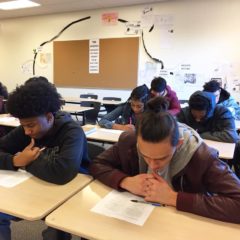I remember being a starry-eyed, youthful 36-year-old English teacher (okay this was 5 years ago, and if I was starry-eyed, it was thanks to Clinique Ultra Volume Mascara) when my colleagues and I gathered in the library to be introduced to another acronym that would save the state of public education: PBIS. PBIS, or Positive Behavioral Interventions and Support, was a multi-tiered system of wraparound services to encourage positive behavior and achievement and discourage negative, anti-social behavior. It was responsive to the social and emotional needs of students, would ensure equitable and appropriate discipline for students under the Individuals with Disabilities Education Act, and would ensure that students understood our school’s simple and consistent behavioral expectations. We would all have to become comfortable with changing the ways in which we handled classroom discipline, starting with lessening our reliance on office referrals and ISS. For the most part, we were on board, accepting the research that this was good for kids.
5 years is enough time to implement a new program, train staff, work out some of the kinks, and evaluate the successes. It’s also enough time to step back and look at what our challenges have been and ask ourselves some tough questions. Teachers work and learn in community, so for my maiden blog post, I would like to have a conversation about PBIS, and its edgier sister, Restorative Justice, which I, admittedly, have zero experience with, but which has been implemented by some area districts.
When I was doing my National Boards (no mascara tube big enough to make me starry-eyed that year), I remember thinking, “I’d be a REALLY awesome teacher if I didn’t have students all the time.” Like many ed reform measures, PBIS works really well on paper. Its implementation was the tricky part. Our district was a PBIS leader in the region, so some of our changes took on the feel of science experiments- “I hypothesize that…90% of students will achieve success under this change!” Most changes were easily accepted by our staff, who’ve enjoyed a long reputation for caring about all kids and having good rapport with students. The most controversial change was shifting discipline away from ISS (many of us thought that ISS was closed for business) and handling disruptive behavior and minor infractions in our classrooms through use of a “buddy system” called Refocus, where students we would usually send out to the hall or to ISS would now be sent next door to a designated colleague’s room where they would ponder their crimes and engage in some deep soul-searching while filling out a half-sheet on how they can make better choices. The rationale? ISS was not an effective deterrent and it pulled kids away from learning. With Refocus, after 5 to 10 minutes in another classroom, they would emerge like a chrysalis and re-enter our classrooms with vigor and a determination to read Romeo & Juliet without their phones out.
We had some skeptics, but we are nothing if not team players, so we tried. And by the year’s end, some found Refocus to work, but many of us quietly swapped it for our own system that did not involve sending kids out to disrupt our co-worker’s classrooms. Five years later, our whole department uses whatever system works best for us and our students. Turns out- one size does not fit all. What have we gained? Better identification of students needing services, incentives and rewards for students doing well and showing improvement, and a lot of conversations on the roots of student misbehavior (trauma, mental health issues, home-school disconnect, culturally unresponsive teaching, kids being kids, etc…) This has been good and necessary, but it’s too early and results are too mixed to declare victory yet.
I asked a dozen colleagues recently about PBIS and what we need to actually implement it successfully. Our long-time ISS supervisor (who many kids regard as a tough-loving mother-figure) said “STRICT discipline.” Another staff member who handles major discipline asked for a simplified system without so many steps or warnings before serious consequences are used. A counselor and two administrators said, simply, “staffing”: that we need a full-time mental health counselor or clinician to keep pace with the growing rates of anxiety and depression among teens. That, and alternative means of schooling for students who are not able to work within a traditional school environment.
As for my answer? I worry about a system so forgiving that teenagers develop unrealistic expectations for the world that will greet them after graduation: that bosses will praise their simple act of showing up and punching in on time, that multiple chances will be granted after violating a university’s (or society’s) code of conduct or rule of law, that life will be less flexible and empathetic in meeting their individual needs, shortcomings, desires. I want them to be successful. I want our school to set them up for success. I think we can all do better- myself included. The student group that we can and need to do better by? Boys. 5 years after implementation of PBIS, I looked at the data on our school disciplinary rates by sex. Males made up 74.9% of tardy referrals and 75.2% of referrals for all other infractions. Our school is not an outlier by any means: boys across the country (and developed world) are overrepresented in school discipline and underrepresented among students thriving academically. If a disciplinary system does not work well for half of our student body, it’s time to examine why and work to change it.
